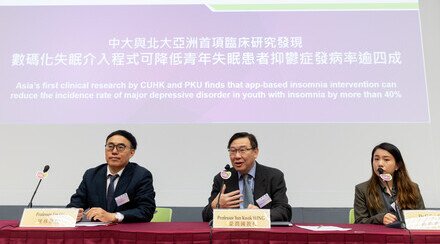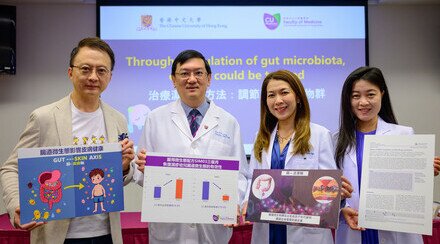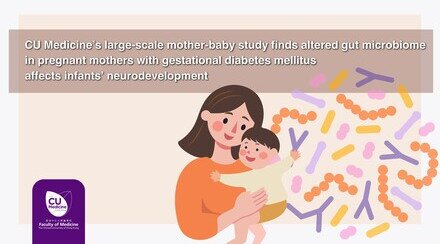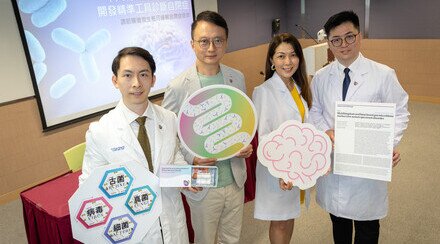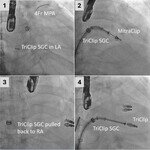CUHK study reveals microbiota modulation is effective in alleviating insomnia
Researchers from The Chinese University of Hong Kong (CUHK)’s Faculty of Medicine (CU Medicine) and Microbiota I-Center (MagIC) found that sleep and mood disturbances could be alleviated by microbiota modulation. Their study on long COVID patients with insomnia found that after receiving faecal microbiota transplantation (FMT) with solutions derived from samples of healthy donors without sleep disturbances, around 40% of patients had insomnia remission three months after the treatment, while only 10% in the untreated control group had the same improvement. Anxiety level of the FMT group was also improved. Study results have been published in the medical journal Clinical Gastroenterology and Hepatology.

Featured in the photo are research team members. (From left) Professor Su Qi, Research Assistant Professor in the Department of Medicine and Therapeutics at CU Medicine; Professor Francis KL Chan, Choh-Ming Li Professor of Medicine and Therapeutics at CUHK; Professor Siew Ng, Croucher Professor of Medical Sciences at CU Medicine and Director of MagIC; and Miss Raphaela Iris Lau, a Hong Kong PhD Fellow at CU Medicine.
Insomnia is characterised by difficulty in falling into sleep, difficulty in maintaining sleep, waking up in the middle of the night and waking up early in the morning but unable to return to sleep. The causes of insomnia are multifaceted and multidirectional. Pharmacological intervention is often used for managing sleep disturbance, but side effects and risk of dependence limited the prolonged use of this treatment.
There are accumulated studies showing that gut dysbiosis may play an important role in long COVID, in which common symptoms include sleep disturbance, anxiety and fatigue. To prove the effectiveness of microbiota modulation in treating insomnia, researchers from CU Medicine and MagIC conducted a clinical study on long COVID patients with insomnia symptoms. They recruited 60 long COVID patients with insomnia symptoms and evenly assigned them to the FMT group and the control group, and assessed their changes in insomnia severity, anxiety level, sleep quality and daytime sleepiness 12 weeks after the start of FMT treatment.
Professor Su Qi, co-first author of the study and Research Assistant Professor in the Department of Medicine and Therapeutics at CU Medicine, emphasised the importance of stringent screening for FMT donors. “In addition to being healthy, our donors reported regular sleeping patterns and good sleeping quality, without a history of sleep or mood disturbances,” he said. “More importantly, their gut microbiome profiles are with high relative abundance of Gemmiger formicilis, which is a top-ranked microbial marker, a deficiency in which indicates a ten-fold higher risk of insomnia after acute COVID-19 infection.”
FMT helps alleviate anxiety, improve sleep quality and reduce daytime sleepiness
Study results showed that around 40% of patients in the FMT group achieved insomnia remission, which was significantly higher than 10% in the control group. Miss Raphaela Iris Lau, co-first author of the study and a Hong Kong PhD Fellow at CU Medicine, added, “Through further analyses of clinical data, we found that anxiety, sleep quality and daytime sleepiness in long COVID patients with insomnia were also improved after FMT. In contrast, there were no significant improvements in the control group.” This is the world’s first study demonstrating that FMT could be an effective treatment for long COVID resulting in improvements in clinical sleep parameters.
Gut bacterial richness is boosted after FMT
Metagenomic sequencing analysis was performed on patients’ stool samples to study changes in gut microbiome composition after FMT. It was found that their gut bacterial richness and the relative abundance of Gemmiger formicilis were significantly boosted.
Professor Siew Ng, CU Medicine’s Croucher Professor of Medical Sciences and Director of MagIC, stated, “Our study reflects that FMT can supplement depleted microbes in the gut of long COVID patients with insomnia, thereby restoring a healthy gut microbiome. These findings once again supported the importance of the gut-brain axis. Restoring a healthy gut microbiota is a novel approach to manage neuropsychiatric symptoms, including insomnia and anxiety.”
Professor Francis KL Chan, Choh-Ming Li Professor of Medicine and Therapeutics and Director of the Centre for Gut Microbiota Research at CU Medicine, concluded, “Our study demonstrates the immense potential of gut microbiota. It not only cures intestinal infections which can be fatal, but it also alleviates sleep and mood disturbances. We will continue to explore the clinical potential of this innovative and potent treatment, to benefit more patients in need.”



